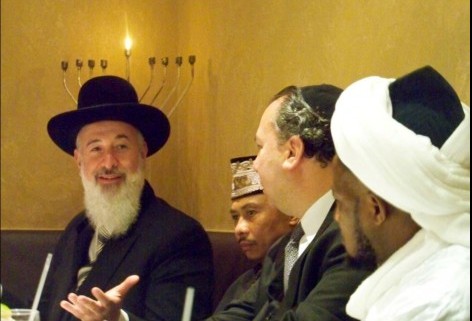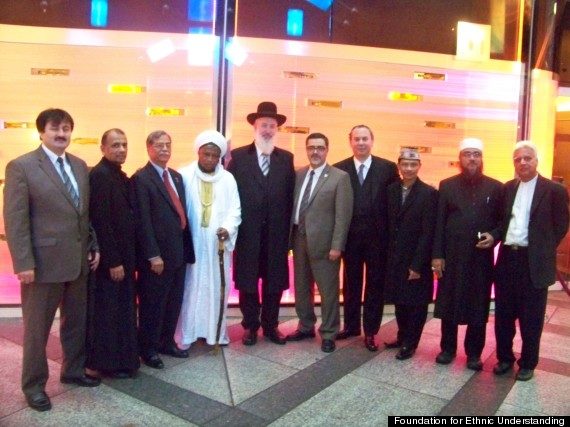
Huffington Post
By Rabbi Marc Schneier
Hanukkah, the eight day holiday which the Jewish people just observed, is first and foremost, about miracles. Hanukkah commemorates both the miracle of the victory of the Jewish people led by Judah Maccabee in their uprising against their Greek oppressors in 165 B.C.E. and the miracle that the menorah in the reconsecrated Temple in Jerusalem burned for eight days, even though there was only enough oil to light it for one day.
To be sure, miracles have always played a major role in Jewish history; indeed, the very survival of the Jews as a people, despite nearly 2,000 years of exile and persecution, is the greatest miracle of all. Yet, in the Talmud, our sages remind us that one must not rely on miracles. Yes, miracles can happen, but one has to work terribly hard for them. There is an enormous human component that goes into the making of a miracle.
Over the past six years, I have been privileged to take part in a modern-day miracle: the establishment of a global movement of Muslims and Jews committed to communication, reconciliation and cooperation. Two weeks ago, as I wrote in my last column, I was one of several rabbis invited to take part in the opening of the King Abdullah International Center for Interfaith Dialogue in Vienna, an institution created by the King of Saudi Arabia and Custodian of the Two Holy Mosques, to strengthen dialogue between world religions — very much including Islam and Judaism. On Dec. 10, the second day of Hanukkah, together with my friend and esteemed colleague, Imam Shamsi Ali of the Jamaica Muslim Center in Queens, the largest mosque in New York City, I organized a festive Hanukkah meal at the SOLO kosher restaurant in midtown Manhattan featuring the Chief Rabbi of Israel Yona Metzger and eight prominent New York area imams and Muslim leaders.
As I noted in my remarks at the luncheon, such an event would have been unthinkable a few years ago; and many people might assume, should have been all but impossible in the wake of the exchange of missile fire between Israel and Gaza last month. However, thanks to the ongoing step-by-step work in which I have been engaged with Imam Shamsi Ali and other visionary Muslim and Jewish leaders around the world; arranging hundreds of mosque-synagogue exchanges every November during our annual International Muslim-Jewish Weekend of Twinning and bringing together European, North American and Latin American Muslim and Jewish leaders to stand together against Islamophobia and anti-Semitism, we have managed to build a framework that allows us to celebrate each others’ holidays together, and to work productively in concert with each other, even at a time of conflict in the Middle East.
That willingness to build ties of cooperation and understanding very much includes Chief Rabbi Metzger, who has made it a point to reach out to imams and Muslim leaders, both within Israel and the Palestinian territories and around the world. Pointing out that through the greater part of the past 1,300 years, Jews and Muslims lived and worked closely together, the Chief Rabbi invoked the miracle of the long burning menorah of Hanukkah to appeal to the New York imams to join with him and like-minded Jews in “spreading the light of Jewish-Muslim understanding.” Responding on behalf of his fellow imams, Shamsi Ali emphasized that “the Middle East conflict is not a Jewish-Muslim conflict but a human one and we have a shared human responsibility to intervene. We don’t have the luxury to become discouraged and give up on the situation; rather we must remain optimistic and keep building our network of contacts.”
Presiding over this historic gathering, the first time a chief rabbi of Israel has sat down together with American Muslim leaders, I reflected that its very occurrence showed about how far Muslims and Jews have come together in six short years and the great opportunity we now have to work together for the betterment of both communities — including helping to bring peace to the Middle East. Indeed, thanks to the efforts in which we have been engaged, there is greater reason for optimism about Muslim-Jewish relations than has existed in a long time.
 Several days later, on the evening of Dec. 13, I was privileged to participate in the menorah lighting ceremony at the White House. Listening to President Obama’s eloquent words at that event, I reflected that he is a man of conviction and principle whom I deeply admire.
Several days later, on the evening of Dec. 13, I was privileged to participate in the menorah lighting ceremony at the White House. Listening to President Obama’s eloquent words at that event, I reflected that he is a man of conviction and principle whom I deeply admire.
Yet, as someone who has been in the vanguard of strengthening black-Jewish relations in America for a quarter of a century, being in Barack Obama’s presence at a Hanukkah celebration at the White House also evoked another miracle that continues to amaze and inspire me: the first-ever African-American President of the United States.
Like the remarkable progress we have achieved in Muslim-Jewish relations, the triumph of the Civil Rights movement of the 1950s and 1960s and the election of President Obama 40 years later, are also examples of miracles that good people worked terribly hard to make happen. The passage of the Civil Rights Act of 1964, the Voting Rights Act of 1965 and other milestones of that movement would never have occurred without the tireless efforts of Americans of diverse backgrounds who came together in support of the struggle of African-Americans for freedom and equality. In fact, as I have noted in my book “Shared Dreams: Martin Luther King and the Jewish Community,” there was no segment of American society which provided as much and as consistent support to Dr. Martin Luther King, Jr. as did the Jewish community.
Among the modern day Maccabees who sacrificed their lives were Jewish civil rights activists Andrew Goodman and Michael Schwerner, who together with their African-American co-worker James Chaney, were brutally murdered in the swamps of Mississippi.
Other brave Jews who joined that struggle included Rabbi Abraham Joshua Heschel, who marched alongside Dr. King from Selma to Montgomery, and countless other rabbis who were arrested and beaten during the Freedom Rides of 1961.
As I stood in the White House and witnessed the first African-American President light the Hanukkah menorah, I felt that the President’s solidarity with the Jewish community that evening was so very fitting given the seeds of the black-Jewish alliance that were planted in the Civil Rights struggle of half a century ago.
As I left the White House that evening, I reflected on the miraculous accomplishments of the Civil Rights movement, confident that we can achieve the miracle of Muslim-Jewish reconciliation as well. Both of these movements remind us of the enormous human effort that goes into the making of a miracle.
 Rabbi Marc Schneier is President of the Foundation for Ethnic Understanding and Vice President of the World Jewish Congress. Schneier is co-authoring a book on Muslim-Jewish relations entitled Sons of Abraham, with Imam Shamsi Ali of the Jamaica Muslim Center, New York City’s largest mosque, to be published by Beacon Press in the Fall of 2013.
Rabbi Marc Schneier is President of the Foundation for Ethnic Understanding and Vice President of the World Jewish Congress. Schneier is co-authoring a book on Muslim-Jewish relations entitled Sons of Abraham, with Imam Shamsi Ali of the Jamaica Muslim Center, New York City’s largest mosque, to be published by Beacon Press in the Fall of 2013.
Copyright © 2025 Foundation For Ethnic Understanding. All rights reserved. | Privacy Policy